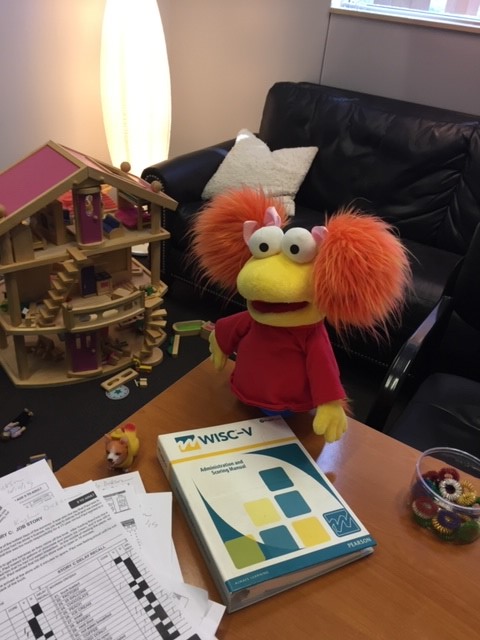Wouldn’t it be awesome if every child loved school like this kiddo?

I believe that every child has the potential to love school.
Some kids just need more support along the way.
Neuropsychological testing has MANY benefits, such as:
#1 Neuropsychologists identify your child’s learning style and mental health needs
During testing, neuropsychologists test various aspects of your child’s learning, such as expressive vocabulary development, spatial reasoning, working memory, processing speed, fine-motor speed and dexterity, reading, writing, and math skills.
Based on these findings, the evaluator can better-understand your child’s specific learning style. For example, if your child is great with hands-on tasks (e.g., replicating block designs), yet struggles with language-based tasks (e.g., defining words, reading, writing), the neuropsychologist will likely recommend hands-on learning opportunities for your child in school to supplement verbal instruction (e.g., writing out words in sand or shaving crème and sounding out each letter along the way).
Neuropsychologists will also assess your child’s mental health. For example, if your child rates above average in anxiety relative to kids his or her age, and shares about frequent worries during the clinical interview, the neuropsychologist will talk with you and your child about ways to address this (e.g., therapy, relaxation exercises, parent guidance).
Believe it or not, many kids don’t tell their parents the things they tell neuropsychologists, as they don’t want to worry their parents! Neuropsychological Testing allows kids to have an opportunity to talk with an impartial person about how they truly feel, which can be a real gift.
Here’s a picture of my desk at the office mid-evaluation during my lunch break. Neuropsychologists like to have fun too! Make sure you tell your child there will be toys to play with during breaks 🙂 Most neuropsychologists give kids rewards for their hard work 🙂

#2 Neuropsychologists make school-based and private recommendations
For example, if a child performs within the well below average range in expressive and receptive language (e.g., defining words and tracking directions), I may recommend a private speech and language evaluation to gather more information about your child’s language skills. Speech and language therapy may be necessary to strength your child’s expressive and/or language skills. This can make a huge difference in many aspects of your child’s development, even socially.
Think about it. If your child struggles to express himself, he may frustrate easily with peers or withdraw from kids altogether.
Neuropsychologists also help with school-based recommendations. For example, if a child has slow processing speed and can’t get through homework within a normal time-frame, which is super common in kids with ADHD, I may recommend modified homework assignments (e.g., allow the student to complete every 3rd math problem) and added time for testing.
#3 Neuropsychologists follow your child’s learning over time
This one is so important. Parents often tell me that they find great comfort in having me update their child’s testing every few years. While this is not necessary for all children with ADHD, for many kids, given their uneven learning (e.g., memorizing history facts is a piece of cake, while learning math facts is torture!), updating testing can provide tremendous support for the child and family.
For example, if your child struggles with reading, the neuropsychologist can identify the specific challenge(s) your child is experiences in reading, like difficulty blending sounds or poor phonemic awareness. Then, the neuropsychologist can tailor recommendations for the reading specialist. In one to two years, when testing is updated, the neuropsychologist can check your child’s reading progress. If it’s minimal, interventions should be tweaked.

#4 Neuropsychologists are a strong referral source
Neuropsychologists work with many different specialists, like occupational therapists, speech and language therapists, psychiatrists, psychiatric nurse practioners, neurologists, play therapists, social workers, psychologists, in-home therapists, and more.
That being said, we get to know who does a great job, and who doesn’t.
That’s pretty invaluable information in my book.
#5 Neuropsychologists help with educational decisions and planning
Let me give you an example. As a parent who has raised an ADHD son myself, I used to fret about his transitions between elementary, middle and high school. Having my son tested was very helpful in guiding his educational transitions, such as from middle to high school.
Neuropsychologists also help teens prepare for college.
Just this year alone, I’ve helped at least five young adults connect with disability services in college settings to develop plans on how to access adequate support.
Wrapping Up
5 Reasons to Consider Neuropsychological Testing for Your Child are:
- Testing clarifies a student’s unique learning and mental health needs.
- Testing guides private and school-based recommendations.
- Neuropsychologists can track your child’s learning over time.
- Neuropsychologists are well-connected with the community.
- Neuropsychologists can help with educational decisions.
I hope you found this information helpful. If you did, please “like” my website, ADHD&U, and subscribe to my blog and newsletter! Check out my podcast, Finding Your Brilliance, too. My son, Will, has great insights about his educational journey. Like most ADHDers, he says it like it is. He’s in college now 🙂
Feel free to contact me with any questions. I love engaging with my readers.
Signing off,
Your ADHD Guru and Friend!


